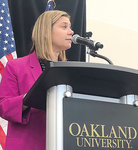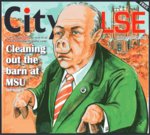









1. Development booms
Cranes have been swinging in the skyline over Greater Lansing all year long. So many, it’s hard to keep count.
Over the last year, developer Pat Gillespie announced — and started — plans for the first hotel that Lansing has seen built in more than 30 years. It’ll open next year, in a complex in the 600 block of East Michigan Avenue that also comprises retail — featuring Meijer’s Capital City Market — and loft-style apartments.
More apartments (and a lot of student housing) have also popped up all across downtown East Lansing. The Center City District building downtown includes senior and mixed-market housing to complement retail space below. The Hub, a 10-story mixed-use building on the corner of Grand River Avenue and Bogue Street, opened earlier this year. Plans are also underway to expand down Bogue with another 14-story, 720-unit apartment building.
Okemos’ downtown is headed toward upcoming commercial revitalization too; some of it is already in the works. Another developer wants to restart plans at the historic Bethlehem Temple Building in Old Town — this time with $9 million in renovations to include plenty of space for retail shops, offices and more loft apartments.
McLaren Greater Lansing is chipping away at a $450 million hospital on the edge of Michigan State University. Eastern High School moved a few blocks east, having turned over the keys to the 101-year-old building to Sparrow Health System, which has not said yet what it will do with it. And the former Red Cedar Golf Course is being shaped into more apartments and commercial space by the hands of developers Joel Ferguson and Frank Kass.
In Windsor Township, cannabis titan Green Peak Innovations continues to expand its massive growing facilities while competitors circle in on other vacant industrial space throughout Greater Lansing. Extensive renovations at Oliver Towers are nearly finished downtown. Metro Place Apartments will soon fill in the space at the old YMCA site.
It’s a catchphrase so overused that even Mayor Andy Schor is starting to find alternatives, but Lansing’s time truly is now. The bustle of development in the region easily solidified itself as the No. 1 story of 2019.
2. Slotkin votes to impeach
U.S. Rep. Elissa Slotkin, D-Holly, who represents Ingham County, capped off the year by helping secure President Donald Trump’s impeachment on the floor of the U.S. House of Representatives. Last week’s vote, which split along party lines, charged Trump with abuse of power and obstruction of justice over alleged coercion of a foreign government.
Slotkin’s politically competitive district was previously held by a Republican for nearly 20 years and carries a 56% GOP political base.
Slotkin publicly defended her decision to support impeachment. The first-term Democrat told a raucous town hall meeting at Oakland University — in the heart of the Republican end of her district — that based on her intelligence experience, she was comfortable with making the hard decision when “the security of the country is at stake.”
“I made this decision out of principle, and I will stick with that decision regardless of what this does to me politically because this is bigger than politics,” Slotkin told the crowd, later adding that impeachment — the legislative equivalent of an indictment — was put into the Constitution because “nobody is above the law.”
3. Election upsets in Lansing, East Lansing
Challenger Brandon Betz defeated two-term Lansing City Councilwoman Jody Washington in November, setting the stage for a progressive shift at City Hall. His win showcased a newfound preference (largely from younger voters) for a left-facing future in the city’s First Ward.
Only time will tell whether Betz’ campaign promises — like more judicious use of tax incentives for developers and a more conducive market for marijuana — will match his performance as Councilman over the next four years. Erik Altmann was unseated.
In East Lansing, Jessy Gregg and Lisa Babcock have already taken their seats on City Council. Mark Meadows held on for another term, but his mayoral gavel was passed off to Ruth Beier shortly.
Babcock, an attorney, has been a sharp critic of the political scene. Gregg is an artist, owns a boutique fabric store and has long written important public service journalism for East Lansing Info. Both provide important perspectives to help ensure the city remains vibrant and the government stays transparent.
Together, it all points to an active — and newsworthy — year ahead as they get settled into their new positions.
4. Black teen’s arrest prompts protests
Two officers at the Lansing Police Department faced reprimands — and sparked a citywide controversy — after video footage circulated that showed one of them repeatedly striking a teenage girl who resisted arrest in June. Both were placed on leave while protests formed and an investigation ensued into possible excessive use of force.
Meanwhile, crowds gathered at City Hall to demand wholesale changes at the Police Department in the wake of what many labeled as unnecessary police brutality aimed against the blacks. Some called for both officers to be fired. Black Lives Matter activists also sought police changess.
Both officers returned to duty after some extra training, but the incident prompted a directional shift within the department amid concerns over how officers should conduct themselves. Adjusted training protocols — particularly for how to peacefully deal with teenage suspects — remain a priority.
In August, Daryl Green, a 22-year veteran of the Lansing Police Department, took over as the city’s newest police chief following Michael Yankowski’s retirement. He’s the second African-American to head the department and has talked openly but carefully about police matters and areas where the force can improve.
5. Engler resigns from MSU
After John Engler left Michigan State University in January, officials were set on crafting a renewed vision of healing and accountability. That mentality is still forming, but it’s one many said would have been all but impossible under the leadership of the bullheaded former governor with a penchant for saying the wrong thing.
Engler’s brief and highly criticized tenure, amid possibly the darkest period in the university’s history, was marred by distrust. He once suggested Nassar survivors might be “enjoying” the media spotlight. He also claimed some of them had spoken out for financial gain. Students were blindsided by his appointment. Engler’s missteps largely overshadowed any benefits brought to campus — and many celebrated his departure.
“Good riddance,” Progress Michigan Director Lonnie Scott said. “It’s too bad Michigan had to suffer more than once with the insufferable lack of leadership that is John Engler. It has always been clear Engler was unfit for such a critical position at a critical time for the university. This was long overdue.”
6. Sparrow Hospital fails inspection
The Joint Commission, a national accrediting organization, issued a preliminary denial of Sparrow Hospital's certification after an unannounced safety inspection revealed scores of deficiencies surrounding patient care. After the hospital was dinged for more than 90 concerns, hospital officials quickly started work to correct any outstanding issues — at times bribing staff with candy to meet certain hospital safety standards.
After City Pulse broke news of the report, hundreds of copies of the newspaper that contained the article disappeared from Sparrow-owned facilities without explanation. By July, after several more inspections and three months of limbo, the hospital prevailed and is once again in full compliance with the Joint Commission.
7. Lansing Fire Dept. faces bias suit
In January, a lawsuit filed by black firefighter Michael Lynn Jr. against the Lansing Fire Department alleged a pattern of racial discrimination and retaliation within its ranks. Lynn said that in 2016 he found a banana on the windshield of his assigned firetruck in an incident he labeled as deliberate discrimination.
The controversy intensified after the department announced a newly hired class of firefighters that failed to include a single woman or African American. That contrasted with the hiring record between 2014 and 2016 when 22 of the 56 firefighters hired had identified as minorities, meaning anything other than white men.
City officials — including Mayor Andy Schor — were roundly disappointed by the lack of diversity in the latest hiring round. They’ve since pledged to bolster diversity within the department through expanded hiring techniques, including a renewed focus on attracting diverse candidates from Lansing’s local high schools.
This year also saw the hiring of Fire Chief Michael Mackey. He said racial tensions can be eased, at least in part, by being “open, transparent, honest, broad-minded and really bringing in people from various backgrounds.” Meanwhile, Lynn said his lawsuit against the department will continue into 2020.
8. Recreational weed wins approval
It’s been another big year for marijuana in Michigan.
Some experts are pointing to Lansing as the next big boomtown for the marijuana industry as prescription pot continues to provide lucrative business opportunities and entrepreneurs set their sights on recreational sales.
One year after marijuana was legalized for adult use, recreational storefronts remain limited to Ann Arbor and a few other towns in southeastern Michigan. But Lansing, with its wealth of vacant industrial space and aspirations for a progressive-leaning government, could be poised to become a major player in the weed scene.
The Lansing City Council amended the city’s ordinance on marijuana in October to allow for up to 28 recreational marijuana retailers. Some, like incoming Councilman Brandon Betz, would like to see that limit increased to 50 as officials look to bolster business and put Lansing at the forefront of the industry.
Council also allowed for four microbusinesses that can grow and sell up to 150 pot plants on site, in addition to up to 75 commercial-scale growers. More than 100 growing licenses have been approved or conditionally approved to date. And four marijuana “social clubs” could also eventually open for onsite consumption.
“I don’t see marijuana as a one-time thing,” said Mayor Andy Schor. “It’s now legal and it’ll continue to be legal and there will be money to be made for everyone just as soon as we’re able to issue licenses.”
9. Soccer team comes and goes
Maybe Lansing’s local baseball stadium wasn’t the best place to watch a soccer game. Maybe tickets for the inaugural season of the Lansing Ignite were just too pricey at $15-22. Maybe it was because one of the players called a heckler a “faggot” at an away game. Who knows? But Lansing’s professional soccer days are over.
Lansing Ignite —the city’s first and only professional soccer team — wrapped up its inaugural season earlier this year. Then it pulled the plug on the franchise. The team generated a lot of buzz in the city but still reeled in fewer than 2,800 fans per game. And that’s a lot fewer than the 4,400 average for the Lugnuts.
Lansing punched above its weight to land the Ignite franchise, gaining a professional soccer team even as Michigan’s largest metro areas — Detroit and Grand Rapids — went without. And while the fans who turned out for games seemed passionate about the sport, it just seems there weren’t enough of them to go around.
It might’ve used a lot of city subsidies (at least $200,000 a year just for sod conversion) but sometimes not every risk proves to be worth the reward. Like Council Vice President Peter Spadafore said shortly before the team’s demise: “It shows we are a community that’s not afraid to try new things. … Lansing’s time is now, right?”
10. City Market building empties
After a lengthy dispute with Waterfront Bar & Grill, the city of Lansing is finally ready to trudge forward with plans to revive the former Lansing City Market building. But in the meantime, it still sits vacant on the riverside.
The Michigan Supreme Court in September refused to take an appeal from Waterfront, ending a contentious, 16-month legal battle between the bar and the Lansing Entertainment and Public Facilities Authority. They’ve since moved out, clearing the way for new development, but no concrete plans have formed.
City officials are still mulling development potential, including the possibility of a brewery. Mayor Andy Schor said he plans to lease the market for private event space while his administration works to find a permanent use. Waterfront hasn’t yet reopened in Lansing, but its owners have long discussed the possibility of a new location.
Support City Pulse - Donate Today!
Other items that may interest you

Comments
No comments on this item Please log in to comment by clicking here